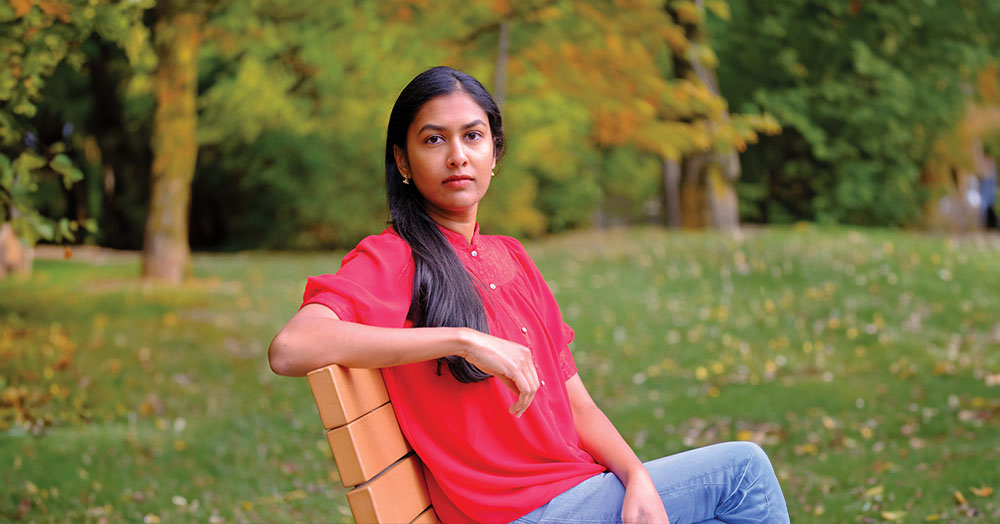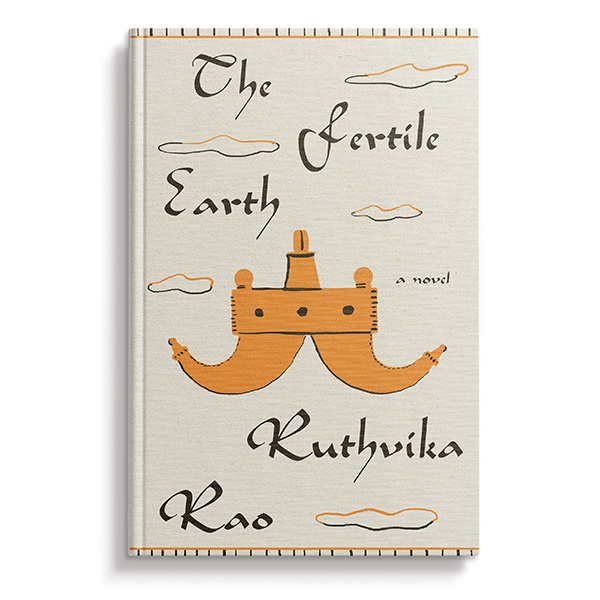How Iowa Helped a Computer Programmer Become a Breakout Novelist
 PHOTO COURTESY RUTHVIKA RAO
Former computer programmer Ruthvika Rao realizes her dream of becoming an author with The Fertile Earth, a love story across social classes.
PHOTO COURTESY RUTHVIKA RAO
Former computer programmer Ruthvika Rao realizes her dream of becoming an author with The Fertile Earth, a love story across social classes.
Ruthvika Rao (22MFA) plays the long game. She studied and worked in computer programming for 12 years to pay for her dream of being a writer. “My takeaway was that I can do the thing that I don’t want to do,” says Rao, a graduate of the Iowa Writers’ Workshop. “Now that I have this life as a writer, I try not to be lazy or take it for granted.”
Her motto: Show up every day to do the work.
Pregnant at the time she moved from Michigan to Iowa in 2020, Rao spent the first eight months racing to finish her book before her son was born, in April of the following year. Her debut novel, The Fertile Earth, a love story across social lines, is set in her birthplace of Telangana, India.
Rao spoke to Iowa Magazine from her home in Michigan.
Can you talk about the evolution of this book and how the Iowa Writers’ Workshop influenced your work?
I wanted to write a story that would hold up a big social canvas of a particular time and place, like Dr. Zhivago or A Suitable Boy. Both books have so many different characters, and all of it is held together by the thread of a love story. I’m also generally fascinated by the themes of childhood and romantic love. So, I thought I’d put those two things together.
At the time, I didn’t know anything about writing. Then I saw in an interview that Haruki Murakami writes eight hours a day, so that’s what I did the summer before I applied to Iowa. I would get up in the morning, get dressed, and then write until 5. It felt like I was hypnotizing myself into this place, and by the end of the three months I had a 500-page manuscript. Then I spent three years revising it.
The workshop experience was life-changing. In the beginning, I was scared to come to this place where all these very talented people show up. But in each semester, by some incredible luck, I was matched to the right teacher. My first workshop was with Sam Chang (93MFA). Her classes are very collegial; the work is handled gently. I felt very comfortable going up for workshop. My final class was with Margot Livesey. At that stage, I needed to learn to cut things that I had grown attached to over three years. She cut 30 pages. It was the right move at the right time. Had that happened at the beginning of my time at the workshop, I would have resisted it.
Your novel is largely rooted in rural Telangana, a world not even familiar to most Indian readers. What were some challenges in translating that world into a work that you want to be read globally?
I wrote the book in English because it’s the language I’m most comfortable writing in. However, in this place, nobody is speaking in English. So, one challenge was getting the sense of this other language existing beneath the English, to make it visible without it being obvious. I tried not to include too many words in Telugu, because it makes the page brittle. It breaks the dream a little.
Also, when I’m writing, English is my first language, but when I’m speaking it’s my second language. When the characters speak, the dialogue happens in my head in Telugu and then I have to translate it. So, I have to bring in some of that translation, the feeling of sensational translation into the world. That was a big challenge.
You’ve described this book as a love story. What are your inspirations for this book?
So much of the book is influenced by my reading life. I was on a strict reading diet growing up. My father would control what I read, like an athlete parent controls a child’s diet. He would expose me to these giant tales from the Mahabharata. I wasn’t allowed foreign books, except the Russians. Some pieces of those storytelling traditions are visible in the book.
Everything in this book is some version of me. Either it’s a reading influence or some personal connection—all of it feels like a slant truth. I feel like I could claim every piece of this book.

